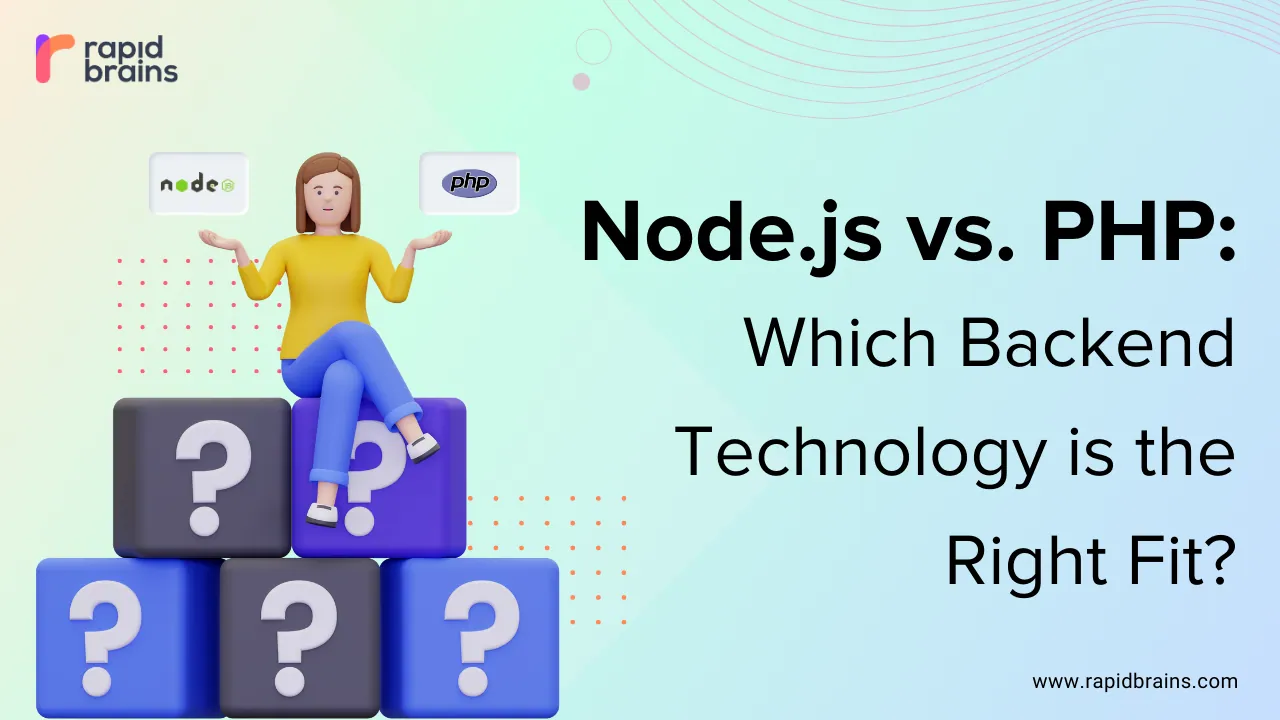
Introduction
In the world of web development, choosing the right backend technology is crucial to the success of your project. Node.js and PHP are two popular options that developers often consider. Both have their strengths and weaknesses, and the decision of which one to use depends on various factors, including the project requirements, team expertise, scalability needs, and performance expectations. In this blog post, we’ll compare Node.js and PHP to help you make an informed decision for your backend technology.
Node.js: The Asynchronous Powerhouse
Node.js is an open-source, cross-platform runtime environment that enables developers to execute JavaScript code outside of a web browser. One of the defining features of Node.js is its event-driven, non-blocking I/O model, making it an ideal choice for handling real-time applications and streaming data. Here are some key advantages of using Node.js:
- High Performance: Node.js employs the V8 JavaScript engine from Google, known for its speed and performance. Asynchronous operations enable handling a large number of concurrent connections efficiently, making Node.js an excellent choice for applications that require high scalability.
- Single Language Stack: Node.js allows developers to use JavaScript for both frontend and backend development, which can lead to increased productivity and ease of code sharing between different parts of the application.
- Vibrant Ecosystem: Node.js has a vast and active community that contributes to an extensive collection of libraries and modules via NPM (Node Package Manager). This rich ecosystem provides solutions for various functionalities, saving development time and effort.
- Real-time Applications: Node.js excels in building real-time applications like chat applications, collaborative tools, and multiplayer games, where timely data updates are crucial.
- Asynchronous I/O: Node.js excels at handling asynchronous operations, making it ideal for applications with high concurrency and real-time requirements.
- Scalability: The non-blocking I/O model of Node.js enables horizontal scaling, allowing applications to handle increased traffic without compromising performance.
Pros of Node.js:
- Single language for both frontend and backend (JavaScript).
- Fast and efficient for handling asynchronous operations.
- Extensive package ecosystem through NPM (Node Package Manager).
- Scalable due to its non-blocking I/O model.
Cons of Node.js:
- JavaScript’s callback hell can lead to complex and hard-to-maintain code.
- Not as mature as some other backend technologies.
- More challenging to handle CPU-bound tasks efficiently.
PHP: The Battle-Tested Classic
PHP (Hypertext Preprocessor) is a widely-used server-side scripting language that has been the backbone of many web applications for decades. With its simplicity and flexibility, PHP has powered millions of websites across the internet. Here are some compelling reasons to consider PHP for your backend needs:
- Easy to Learn: PHP is relatively easy to learn, especially for developers with a background in C-like syntax languages. Its gentle learning curve allows developers to quickly get started and build web applications without extensive training.
- Huge Community Support: PHP has a vast and experienced community of developers who actively contribute to various PHP frameworks like Laravel, Symphony, and CodeIgniter. These frameworks provide a structured and organized approach to web development.
- Hosting Options: PHP enjoys wide support from web hosting providers, making it easy to find affordable and reliable hosting solutions for PHP-based applications.
- Integration with Databases: PHP has robust support for various databases like MySQL, PostgreSQL, and MongoDB, making it straightforward to interact with databases and manage data in web applications.
- Content Management Systems: PHP is the backbone of many popular content management systems (CMS) like WordPress, Joomla, and Drupal.
Pros of PHP:
- Easy to learn and use, especially for developers with a background in C-like languages.
- Extensive community support and vast resources available online.
- Wide compatibility with various web servers and operating systems.
- Excellent for building dynamic web pages.
Cons of PHP:
- Not as efficient for handling asynchronous operations.
- Can lead to spaghetti code and lack of proper structure if not managed well.
- Limited support for modern programming paradigms like functional programming.
Performance and Scalability
Performance and scalability are critical factors when deciding on a backend technology. Node.js, with its non-blocking I/O model, excels in handling large numbers of concurrent connections and real-time applications. On the other hand, PHP’s performance heavily relies on the web server configuration and the way the code is written.
For CPU-intensive tasks, Node.js may have an edge over PHP, thanks to its asynchronous nature. However, PHP is still capable of serving smaller projects and may perform exceptionally well when combined with caching mechanisms like Redis or Memcached.
Community and Ecosystem
Both Node.js and PHP have vibrant communities and extensive ecosystems of libraries, frameworks, and tools. Node.js benefits from the vast npm repository, enabling developers to find and integrate numerous packages easily. PHP, on the other hand, has the advantage of its long-established presence and support from major content management systems like WordPress, Joomla, and Drupal.
Developer Skillset
Another crucial aspect to consider is the skillset of your development team. If your team is already well-versed in JavaScript or comes from a frontend background, Node.js might be a natural fit. Similarly, if your developers are familiar with PHP or have prior experience with the language, PHP may be the preferred choice.
Choosing the Right Fit
The decision between Node.js and PHP ultimately depends on your project’s specific requirements and objectives:
Choose Node.js if:
- Your project involves real-time applications, such as live chat or collaboration tools.
- You prioritize performance and scalability, especially for applications that handle a high number of concurrent connections.
- You want to use a single language (JavaScript) for both frontend and backend development.
Choose PHP if:
- Your development team is more comfortable with a language that is easy to learn and widely used.
- Your project requires strong integration with databases and existing backend systems.
- You need a mature ecosystem with a wide array of libraries and frameworks for rapid application development.
Conclusion
In conclusion, the choice between Node.js and PHP depends on various factors, including project requirements, performance expectations, team expertise, and scalability needs. Node.js is ideal for real-time applications and asynchronous operations, while PHP is excellent for simpler web applications and content management systems.
Ultimately, both technologies have their merits, and there is no one-size-fits-all solution. It’s essential to carefully evaluate your project’s specific needs and your team’s expertise before making a decision. Whichever technology you choose, staying up-to-date with best practices and leveraging the strengths of your chosen backend will lead to a successful and efficient web application.




